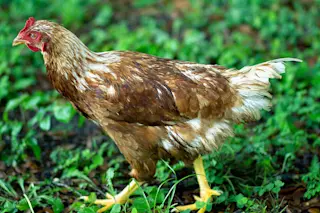Photo: flickr/Drew CoffmanAre you worried about getting malaria? Well, according to this study, you might be able to avoid it by carrying a chicken everywhere you go. Here, scientists report that Anopheles arabiensis mosquitoes -- the species that carries malaria -- do not bite chickens, and are actually repelled by their odor. In fact, when the researchers set up traps, many fewer mosquitos were captured in traps next to a caged chicken. The researchers also identified the specific chemicals in "chicken odor" that repel the mosquitoes. These findings may lead to insect repellents based on chicken odor, and give "tastes like chicken" a whole new meaning!Chicken volatiles repel host-seeking malaria mosquitoes "Background Anopheles arabiensis is a dominant vector of malaria in sub-Saharan Africa, which feeds indoors and outdoors on human and other vertebrate hosts, making it a difficult species to control with existing control methods. Novel methods that reduce human-vector ...
Want to avoid malaria? Just wear a chicken.
Discover how chicken odor repels malaria mosquitoes like Anopheles arabiensis and could lead to innovative insect repellents.
More on Discover
Stay Curious
SubscribeTo The Magazine
Save up to 40% off the cover price when you subscribe to Discover magazine.
Subscribe













